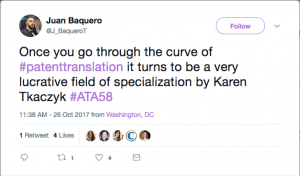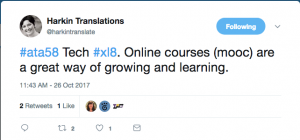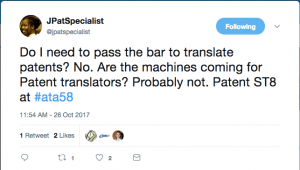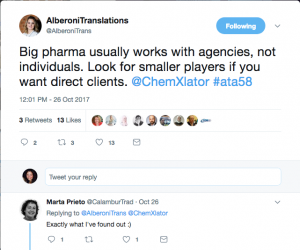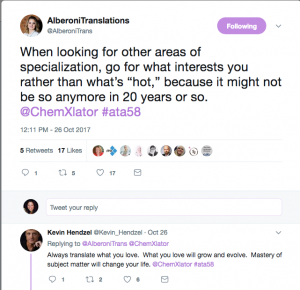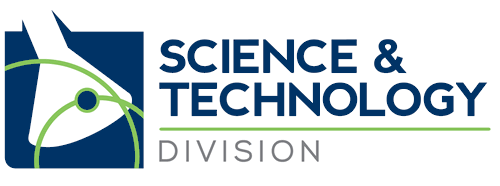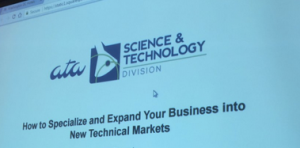
Panel discussion held Thursday, October 26th, 2017
Washington D.C. Hilton
ATA 58th Annual Conference
Panel:
Dr. Karen Tkaczyk
Dr. Nicholas Hartmann
Dr. Matthew Schlecht
Dr. Lebzy González (Moderator)
By Patrick Weill, CT
The published summary of this panel included the following text: “The panel will discuss the career trajectories of three experienced technical translators, including how they developed new areas of specialization throughout the years and what strategies they still see as relevant in today’s business environment.” This plan was successfully executed; the room was full, the session was very interactive, with many questions from the audience, and people were even actively quoting the panelists on Twitter (see photos below).
Dr. González, the moderator, would ask a question followed by responses from all three panelists.
The first question was “How did you become a translator and how did your specialization evolve?”
Dr. Hartmann replied that there is a certain element of theatricality in translation; he stated that we need to know what kind of writing our target audience is expecting to read (poetry, journal articles, etc.) and that we can learn how to produce such work by doing targeted reading in our target language. Dr. Hartmann explained how he had deliberately cultivated his German and learned what patent attorneys expected to read; he indicated that none of his friends wanted to touch German patents and that in this way he successfully established one of his niches. Dr. Schlecht replied that he had played to his strengths, using his previous training. Then, the discussion led to types of translation work and Dr. Tkaczyk indicated that there is a steep learning curve in patents but once a translator has understood how they are supposed to read, s/he can earn a good income by taking advantage of what one panelist referred to as the “liturgical aspect” of patent texts. Dr. Schlecht also emphasized the repetitive nature of batch records and indicated a similar opportunity for good income.
In reference to training and specialization, Dr. Tkaczyk mentioned MOOCs: Massive Open Online courses, while Dr. Schlecht confirmed that such training is important due to the fact that content is key in patent translation.
Dr. Popp, from the audience, made a comment about how his recommendation would not be to focus on becoming a patent agent, but rather to read patents and understand them. He further stated that most patent lawyers/firms make their profits through litigation, not filing, implying that there are also more translation opportunities in litigation than in filing. Dr. González reminds us that this is an important piece of information for newbies, particularly for languages that are not German, Japanese, or French.
Dr. Tkaczyk then talked about non-native editing of journal articles as another related and solid source of income. In this work she edits academic papers written in English by researchers not native to the English language. She and Dr. Hartmann further indicated that translators should look for small to mid-size outfits as direct clients since big companies tend to work with agencies, while smaller clients are more willing to work with individual translators.
Then Dr. Berger from the audience asked what happens when a good smaller agency gets gobbled up by a larger agency, to which Dr. Tkaczyk responded that it is precisely for this reason that she maintains a big basket of clients, while Dr. Schlecht said that one thing we can do is to send agencies an updated version of our CV if we haven’t heard from them, even if the changes made are nominal.
A comment was made from the audience regarding this same question from Dr. Berger on consolidation in the language industry. A person from the audience suggested connecting with project managers/boutique owners on social media so that one could stay in touch via agency-external channels. For example, if a PM has changed jobs, LinkedIn notifies us of that fact, creating a good opportunity to message the former PM and congratulate him/her on the new job (subtle reminder of our services) and ask who has taken his/her place at the previous agency (new contact!)
In relation to a question about setting aside time for new fields, Dr. Hartmann stated that he reads “weird things” (i.e. technical material) for fun, and that we are certainly able to explore new fields through judicious use of internet resources. Dr. Tkaczyk said we should go for what interests us rather than what is hot at the moment, whereupon Dr. Hartmann highlighted the importance of being good at what we do, and yes of being interested in it, but the Dr. was adamant and clarified that the kind of work we do does not have to be our passion! In response to the same question, Dr. Schlecht highlighted the importance of keeping current in our existing specialties, while Dr. Tkaczyk replied that since she has 15,000 words of translation per week along with 3 children and a dog, most of her training occurs on the job in fields that are just outside her specialties.
The final question asked was “How does one enter the patent translation market with no specialized degree?” Dr. Hartmann stated that there is an element of luck and also a certain desperation by the agency. Dr. Schlecht agreed and added that in order to get in, sometimes we need to take unpleasant steps such as low rates and weekend work and do the job well, thus getting our foot in the door.
